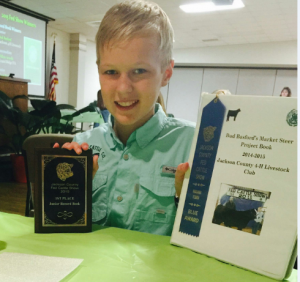In the early years of 4-H, record books were a way to document profit or loss on a project, such as raising and preserving a crop or raising a herd of cattle. Over the years, record books have expanded to include topics like babysitting, robotics and sewing. However the reasons why 4-H encourages youth to complete record books is the same- it is one of the most effective tools in positive youth development. 4-H Record Books foster the Essential Elements of positive youth development through:
- Belonging: 4-H members are awarded for their participation in activities, earning symbols of belonging as they continue in 4-H (e.g. ribbons, achievement pins).
- Mastery: Through competition, 4-H members receive feedback on their participation and record keeping skills so they can improve and grow.
- Independence: 4-H members set and record goals and their progress towards those goals throughout the year. Record books also encourage members to participate in leadership development activities.
- Generosity: 4-H members are provided an incentive to engage in their communities through positive citizenship and community development activities.
However, record books are generally regarded as a chore young people; most fail to realize its value until they reach adulthood. However, many 4-H Alumni still have their record books and will be quick to point out that the process taught them multiple life skills such as:
- Time management and organizational skills.
- Responsibility
- How to set goals
- Preparation for completion of resumes and applications for awards, college scholarships, and jobs
- Financial literacy and keeping track of expenses
- Written communication
But what does the research say? Life skill development through record books is well documented. During a recent study, 4-H alumni were polled regarding their experiences in 4-H and the use of record books (Bikos, Haney, Kirkpatrick-Husk and Hsia. Journal of Youth Development, 2014). Alumni spoke of the real-world applicability of skills acquired during completion of record books to their adult life:
“It prepares us for life after we leave 4-H,” and “It has helped with a number of projects since I’ve left 4-H.”
Comparing skills learned in her Sewing/Needlework project to those gained from completion of record books, one alumnus said:
“Even though I’m not still doing clothing type things, I’m still doing things that I have to take records of.”
Leader perspectives voiced a similar theme but with a more parental tone:
“They may not be really aware of how this is going to relate in their real life, but it’s going to whether they know it, or like it, or not.”
Alumni and leaders who had completed record books reported that the experience helped them successfully apply for college, scholarships, and employment. While most used the record book as an organized resource for easily locating information (e.g., “It was all there for me which was amazing”), a few were able to use the actual record book itself. 4-H members in Florida refer to their record books when completing their 4-H Portfolio, part of the process for applying for state awards and scholarships.
If you have a skill to share and would like to inspire the next generation, consider becoming a 4-H volunteer. We offer a wide variety of roles to fit your interests and schedule. For more information about 4-H, visit our website or contact your local UF IFAS County Extension Office.
Next up, how to complete a record book (the easy way) by Escambia County 4-H Agent Brian Estevez.
Full research article on the benefits of 4-H Record Books
- Hearing Impairment Is No Obstacle for 4-H Youth - December 7, 2018
- Preparing for a Disaster – Keeping Your 4-H Project Animals Safe - September 28, 2018
- Meet Jackson 4-H volunteer Terri Hardin - April 20, 2018


